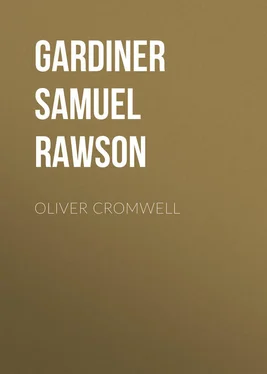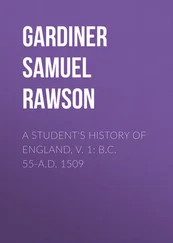Samuel Gardiner - Oliver Cromwell
Здесь есть возможность читать онлайн «Samuel Gardiner - Oliver Cromwell» — ознакомительный отрывок электронной книги совершенно бесплатно, а после прочтения отрывка купить полную версию. В некоторых случаях можно слушать аудио, скачать через торрент в формате fb2 и присутствует краткое содержание. Жанр: foreign_antique, foreign_prose, на английском языке. Описание произведения, (предисловие) а так же отзывы посетителей доступны на портале библиотеки ЛибКат.
- Название:Oliver Cromwell
- Автор:
- Жанр:
- Год:неизвестен
- ISBN:нет данных
- Рейтинг книги:3 / 5. Голосов: 1
-
Избранное:Добавить в избранное
- Отзывы:
-
Ваша оценка:
- 60
- 1
- 2
- 3
- 4
- 5
Oliver Cromwell: краткое содержание, описание и аннотация
Предлагаем к чтению аннотацию, описание, краткое содержание или предисловие (зависит от того, что написал сам автор книги «Oliver Cromwell»). Если вы не нашли необходимую информацию о книге — напишите в комментариях, мы постараемся отыскать её.
Oliver Cromwell — читать онлайн ознакомительный отрывок
Ниже представлен текст книги, разбитый по страницам. Система сохранения места последней прочитанной страницы, позволяет с удобством читать онлайн бесплатно книгу «Oliver Cromwell», без необходимости каждый раз заново искать на чём Вы остановились. Поставьте закладку, и сможете в любой момент перейти на страницу, на которой закончили чтение.
Интервал:
Закладка:
When at last Essex received the command to create a Parliamentary army, Cromwell accepted a commission to raise a troop of arquebusiers – the light horse of the day – in his own county. He can have had no difficulty in finding recruits, especially as his popularity in the fen-land had been, if possible, increased by his conduct in a committee held in the preceding summer, where he bitterly resented an attempt of the Earl of Manchester to enclose lands in defiance of the rights of the commoners. He was, however, resolved to pick the sixty men he needed. We can well understand that in choosing his subordinates he would be inspired by an instinctive desire to prize those qualities in his soldiers which were strongly developed in his own character, in which strenuous activity was upheld by unswerving conviction and perfervid spiritual emotion. He could choose the better because he had neighbours, friends and kinsmen from whom to select. The Quarter-master of his troop was John Desborough, his brother-in-law, whilst another brother-in-law, Valentine Wauton, though not actually serving under Cromwell, rallied to his side, and became the captain of another troop in the Parliamentary army. To the end of his career Cromwell never forwarded the prospects of a kinsman or friend unless he was persuaded of his efficiency, though he never shrank from the promotion of kinsmen whom he believed himself able to trust in order to shake off the charge of nepotism from himself.
The sobriety of Cromwell's judgment was as fully vindicated by his choice of the cavalry arm for himself, as by the selection of his subordinates. If the result of the coming war was to be decided by superiority in cavalry, as would certainly be the case, the chances were all in favour of the Royalist gentry, whose very nickname of 'cavaliers' was a presage of victory, and who were not only themselves familiar with horsemanship from their youth up, but had at their disposal the grooms and the huntsmen who were attached to their service. "Your troops," he said some weeks later to his cousin Hampden, after the failure of the Parliamentary horse had become manifest, "are most of them old decayed serving men and tapsters, and such kind of fellows; and their troops are gentlemen's sons and persons of quality. Do you think the spirits of such base and mean fellows will ever be able to encounter gentlemen that have honour and courage and resolution in them?.. You must get men of spirit, and, take it not ill what I say – I know you will not – of a spirit that is likely to go on as far as gentlemen will go, or else you will be beaten still." The importance of a good cavalry was in those days relatively much greater than it is now. A body of infantry composed in about equal proportions of pikemen and musketeers, the latter armed with a heavy and unwieldy weapon, only to be fired at considerable intervals, and requiring the support of a rest to steady it, needed to be placed behind hedges to resist a cavalry charge. It was a recognised axiom of war that a foot regiment marching across open country required cavalry as a convoy to ward off destructive attacks by the enemy's horse. So unquestioned was the inferiority of infantry, that unless the horsemen who gathered round Charles's standard when it was displayed on the Castle Hill at Nottingham could be overpowered, the resistance of the Parliamentary army could hardly be prolonged for many months. That they were overpowered was the achievement of Cromwell, and of Cromwell alone.
It was something that Cromwell had gathered round him his sixty God-fearing men. It was more, that he did not confide, as a mere fanatic would have done, in their untried zeal. His recruits were subjected to an iron discipline. The hot fire of enthusiasm for the cause in which they had been enlisted burnt strongly within them. They had drawn their swords not for constitutional safeguards, but in the service of God Himself, and God Himself, they devoutly trusted, would shelter His servants in the day of battle against the impious men who were less their enemies than His. It was no reason – so they learnt from their captain – that they should remit any single precaution recommended by the most worldly of military experts. Cromwell almost certainly never told his soldiers – in so many words – to trust in God and keep their powder dry. Yet, apocryphal as is the anecdote, it well represents the spirit in which Cromwell's commands were issued. The very vividness of his apprehension of the supernatural enabled him to pass rapidly without any sense of incongruity from religious exhortations to the practical satisfaction of the demands of the material world.
When on October 23, 1642, the first battle of the war was fought at Edgehill, Cromwell's troop was one of the few not swept away by Rupert's headlong charge, probably because coming late upon the field he did not join the main army till the Royalist horse had ceased to trouble it. At all events, he took his share in the indispensable service rendered by the little force of cavalry remaining at Essex's disposal, when in the opposing ranks there was no cavalry at all. It was the co-operation of this force which, by assailing in flank and rear the King's foot regiments, whilst the infantry broke them up in front, enabled the Parliamentary army to claim at least a doubtful victory in the place of the rout which would have befallen it if Rupert, on his late return, had found his master's foot in a condition to carry on the struggle. Whatever else Cromwell learnt from his first experience of actual warfare, he had learnt from Rupert's failure after early success never to forget that headlong valour alone will accomplish little, and that a good cavalry officer requires to know when to draw rein, as well as when to charge, and to subordinate the conduct of the attack in which he is personally engaged to the needs of the army as a whole.
Many months were to pass away before Cromwell was to measure swords with Rupert. He remained under Essex almost to the end of the year, and was present at Turnham Green, when Essex saw Charles, after taking up a position at Brentford in the hope of forcing a passage to London, march off to Reading and Oxford without attempting to strike a blow. Towards the end of 1642, or in the early part of 1643, Cromwell had work found for him which was eventually to breathe a new spirit into the Parliamentary army. Enormous as was the advantage which the devotion of London conferred upon Parliament, London by no means exercised that supreme influence which was exercised by Paris in the times of the French Revolution. Both parties, therefore, put forth their efforts in organising local forces, but of all the local organisations which were brought into existence, the only one entirely successful was the Eastern Association, comprising Essex, Suffolk, Norfolk, Cambridge and Herts, and that mainly because Cromwell was at hand to keep it up to the mark. There was to be a general fund at the service of the association, whilst the forces raised in the several shires of which it was composed were to be at the disposal of a common committee.
In England generally the first half of 1643 was a time of desultory fighting, alternating with efforts to make peace without the conditions which might have brought peace within sight. It was not to be expected either that Parliament would accept Charles on his own terms, or that Charles would bow down to any terms which Parliament was likely to offer. Cromwell, at least, took no part in these futile negotiations, and did all that in him lay to clear the counties of the Eastern Association from Royalists, and to put them in a state of defence against Royalist incursions. At some time later than January 23, and before the end of February, he was promoted to a colonelcy. In March he was fortifying Cambridge, and urgently pleading for contributions to enable him to complete the work. Again we find him sending to arrest a Royalist sheriff who attempted to collect soldiers at St. Alban's, and then hurrying to Lowestoft to crush a Royalist movement in the town. After this no more is heard of Royalism holding up its head in any corner of the association, and to the end of the war no Royalist in arms again set foot within it. By the end of May it was joined by Huntingdonshire, the county of Cromwell's birth.
Читать дальшеИнтервал:
Закладка:
Похожие книги на «Oliver Cromwell»
Представляем Вашему вниманию похожие книги на «Oliver Cromwell» списком для выбора. Мы отобрали схожую по названию и смыслу литературу в надежде предоставить читателям больше вариантов отыскать новые, интересные, ещё непрочитанные произведения.
Обсуждение, отзывы о книге «Oliver Cromwell» и просто собственные мнения читателей. Оставьте ваши комментарии, напишите, что Вы думаете о произведении, его смысле или главных героях. Укажите что конкретно понравилось, а что нет, и почему Вы так считаете.












